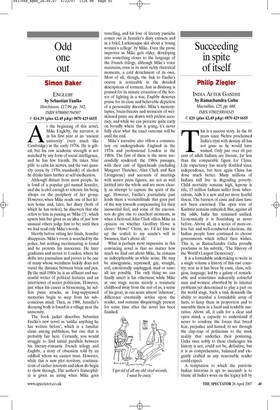Odd one out
Simon Baker
ENGLEBY by Sebastian Faulks Hutchinson, £17.99, pp. 342, ISBN 9780091794507 ✆ £14.39 (plus £2.45 p&p) 0870 429 6655 At the beginning of this novel, Mike Engleby, the narrator, is in his first year at an ‘ancient university’ (very much like Cambridge) in the early 1970s. He is gifted, but his raw academic strength is not matched by any form of social intelligence, and he has few friends. He takes ‘blue pills’ to calm his nerves, and the vast quantity (even by 1970s standards) of alcohol he drinks hints further at self-medication.
Although distant from most people, he is fond of a popular girl named Jennifer, and she is civil enough to tolerate his being always on the periphery of her group. However, when Mike reads one of her letters home and, later, her diary (both of which he has stolen), he discovers that she refers to him in passing as ‘Mike (!)’, which upsets him but gives us an idea of just how unusual others judge him to be; until then we had read only Mike’s words.
Shortly before sitting her finals, Jennifer disappears. Mike’s room is searched by the police, but nothing incriminating is found and he protests his innocence. He later graduates and moves to London, where he drifts into journalism and proves to be one of many whose weirdness luckily does not travel the distance between brain and pen. By the mid-1980s he is an affluent and successful writer of political features and an interviewer of senior politicians. However, just when his career is blossoming, he suffers panic attacks, as long-suppressed memories begin to seep from his subconscious mind. Then, in 1988, Jennifer’s decaying body is found in a village near the university.
The book jacket describes Sebastian Faulks’s new novel as ‘unlike anything he has written before’, which is a familiar claim among publishers, but one that is probably fair here. Certainly, you would struggle to find initial parallels between his literary-romantic French trilogy and Engleby, a story of obsession told by an oddball whom we cannot trust. However, while this is new plot territory, continuations of earlier interests and ideas do begin to show through. The author’s francophilia is given an airing when Mike goes travelling, and his love of literary pastiche comes out in Jennifer’s diary extracts and in a brief, Larkinesque skit about a ‘young women’s college’ by Mike. Even the prose improves as Mike gets older, developing into something closer to the language of the French trilogy, although Mike’s voice maintains, even in its most richly rhetorical moments, a cold detachment of its own. Most of all, though, the link to Faulks’s oeuvre is noticeable in the detailed descriptions of torment. Just as Birdsong is praised for its minute evocation of the horror of fighting in a war, Engleby deserves praise for its close and believable depiction of a personality disorder. Mike’s memorylapses, brain-freezes and moments of wetskinned panic are drawn with pitiless accuracy, and while we can perceive quite early on broadly where this is going, it’s never fully clear what the exact outcome will be until the end.
Mike’s narrative also offers a commentary on undergraduate England in the 1970s and professional London in the 1980s. The first of these is the more successfully rendered; the 1980s passages, with their cast of figureheads (including Margaret Thatcher, Alan Clark and Ken Livingstone) and accounts of meetings with senior press figures, are not as well knitted into the whole and are more clearly an attempt to capture the spirit of the age. However, Faulks’s journalistic past lends them a verisimilitude that goes part of the way towards compensating for their inessential feel, and some of the encounters do give rise to excellent moments, as when a fictional Alan Clark offers Mike an opinion on whether Geoffrey Howe is clever: ‘Howe? Christ, no. I’d let him tie up the codicil to my auntie’s will in Swansea, that’s about all.’ What is perhaps most impressive in this convincing novel is that no matter how much we find out about Mike, he remains as indecipherable as white noise. He may be misogynistic, repressed, gay, straight, evil, emotionally unplugged, mad or sane: all are possible. The only thing we can finally assert is his otherness; while Mike at one stage seems merely a traumatic childhood away from the rest of us, a sense of his great, in one sense almost ‘inhuman’, difference eventually settles upon the reader, and remains disquietingly present for some time after the novel has been finished.
























































 Previous page
Previous page